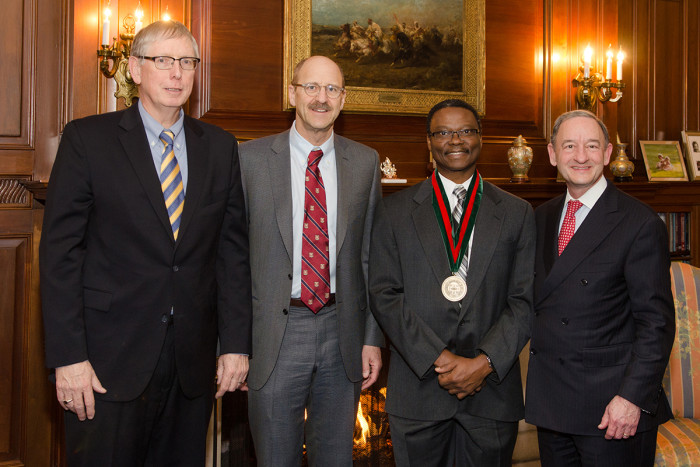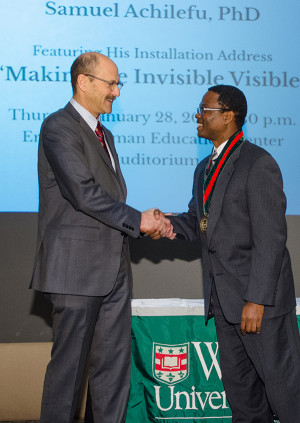Achilefu named inaugural Michel M. Ter-Pogossian Professor of Radiology
Research includes developing technologies that help surgeons see cancer cells
 Mark Beaven
Mark BeavenSamuel Achilefu, PhD, (third from left) has been named the inaugural Michel M. Ter-Pogossian Professor of Radiology. Joining him after his Jan. 28 installation were (from left): Richard Wahl, MD, head of the Department of Radiology; David H. Perlmutter, MD, dean of the School of Medicine and executive vice chancellor for medical affairs; and Chancellor Mark S. Wrighton.
Samuel Achilefu, PhD, whose research includes developing technologies that help surgeons see cancer cells and kill other cancer cells without harming healthy tissue, has been named the inaugural Michel M. Ter-Pogossian Professor of Radiology at Washington University School of Medicine in St. Louis.
The School of Medicine and Mallinckrodt Institute of Radiology are honoring the legacy of Ter-Pogossian – the storied School of Medicine nuclear physicist considered one of the fathers of positron emission tomography (PET) – by creating the endowed professorship named for him. Ter-Pogossian, who died in 1996, led a research team that designed and built the first PET scanner. The imaging technology shows how organs and tissue work when integrated with radionuclides, atoms used as tracers in the body.
“We honor Dr. Ter-Pogossian’s contributions to health and science by establishing this professorship in his name,” Chancellor Mark S. Wrighton said. “It is fitting that the inaugural recipient, Dr. Achilefu, also has demonstrated a deep commitment to the health and well-being of others through innovative research.”
Achilefu holds 56 patents, including for novel methods, drugs and technologies to see and treat human diseases. He also is a Siteman Cancer Center research member.
Achilefu pioneered the development of molecular optical imaging and therapy of human diseases using novel molecular probes and light-sensitive drugs. He discovered a new molecular entity that can be used to deliver drugs to many types of cancer. Achilefu also led a team that developed a wearable goggle-based imaging system for guiding surgical removal of tumors.
Recently, he co-discovered a treatment paradigm for cancer that incorporates a special type of light source and nanomaterials that can find and selectively trigger cancer cell death without harming healthy tissue.
As a principal investigator and program director, he and other School of Medicine researchers received $13.7 million from the National Cancer Institute (NCI) to establish the Center for Multiple Myeloma Nanotherapy, where work is underway on three projects. For his part, Achilefu will oversee development of a treatment that uses a combination of light and a photosensitizing drug to kill cancer cells while minimizing negative effects on healthy tissue. The center is one of six elite Centers of Cancer Nanotechnology Excellence supported by the NCI.
David H. Perlmutter, MD, dean of the School of Medicine and executive vice chancellor for medical affairs, said Achilefu’s work continues a rich tradition of groundbreaking radiology research at Washington University.
 Mark Beaven
Mark Beaven“With this professorship named in Dr. Ter-Pogossian’s honor, we are passing the torch to a new pioneer and a new era of discovery,” Perlmutter said. “Like Dr. Ter-Pogossian, Dr. Achilefu’s work has led to technologies that are changing the way we practice medicine.”
Achilefu, who also is a professor of biochemistry and molecular biophysics and biomedical engineering, serves as director of the Optical Radiology Laboratory and Washington University Molecular Imaging Center. He joined the medical school’s faculty in 2001 after seven years in the Discovery Research Department at Mallinckrodt Medical Inc. in St. Louis.
He earned his doctorate in molecular physical and materials chemistry at the University of Nancy, France, in 1991. In 1993, he completed his postdoctoral training at Oxford University, in England, where he trained in the chemistry of oxygen transport mechanisms and hematology.
Richard Wahl, director of the Mallinckrodt Institute of Radiology and head of the Department of Radiology, said Ter-Pogossian and Achilefu share many similarities in addition to innovation: entrepreneurialism, excellence at team science and a focus on mentoring the next generation of scientists.
“This professorship is a fitting tribute to the work and talents of both researchers,” Wahl said.
In 1946, Ter-Pogossian came to Washington University, where he worked as a research assistant while studying for a degree. He received a master’s degree in 1948 and a doctoral degree in nuclear physics in 1950. He joined the faculty of Mallinckrodt Institute of Radiology in 1950 and was named a professor of radiation sciences in 1961. In 1973, he was named head of Mallinckrodt Institute’s Division of Radiation Sciences, but the self-professed “research junkie” missed his full-time laboratory work, so in 1990, he stepped down to return to his research. Ter-Pogossian assumed emeritus status in 1995. The following year, while visiting Paris, he died of a heart attack.
“I am thrilled to be named the inaugural Michel Ter-Pogossian endowed chair in radiology,” Achilefu said. “This honor recognized the enormous efforts by my collaborators, staff and trainees toward the eradication of cancer. Without their commitment to this mission, good ideas would still be just ideas.”






